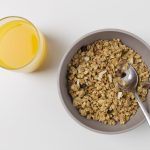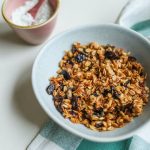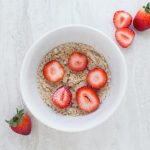How oats is benefit to health: Studies present that oats and oatmeal have many health benefits. These include weight loss, lower blood sugar levels, and a reduced risk of heart disease.
Oats are among the many healthiest grains on earth. They’re a gluten-free whole grain and an awesome supply of important vitamins, minerals, fiber, and antioxidants.
Here are 9 evidence-based health benefits of eating oats and oatmeal.
Table of Contents
What are oats and oatmeal?
Oats are a whole grain food, recognized scientifically as Avena sativa.
The most intact and whole kind of oats are oat groats, which take a long time to prepare dinner. For this cause, many people desire rolled, crushed, or steel-cut oats.
Instant (fast) oats are essentially the most extremely processed selection. While they take the shortest time to prepare dinner, the feel could also be mushy.
Oats are generally eaten for breakfast as oatmeal, which is made by boiling oats in water or milk. Oatmeal is usually referred to as porridge.
They’re also usually included in muffins, granola bars, cookies, and different baked goods.
SUMMARY
Oats are a whole grain generally eaten for breakfast as oatmeal (porridge) and added to baked goods.
1. Oats are extremely nutritious
The nutrient composition of oats is well-balanced. They are a superb supply of carbs and fiber, including the fiber beta-glucanTrusted Source.
Oats are also a superb supply of high quality proteinTrusted Source, with a superb balance of important amino acids.
Oats are loaded with important vitamins, minerals, and antioxidant plant compounds.
Half a cup (40.5 g) of dry oats containsTrusted Source:
- Manganese: 63.91% of the day by day worth (DV)
- Phosphorus: 13.3% of the DV
- Magnesium: 13.3% of the DV
- Copper: 17.6% of the DV
- Iron: 9.4% of the DV
- Zinc: 13.4% of the DV
- Folate: 3.24% of the DV
- Vitamin B1 (thiamin): 15.5% of the DV
- Vitamin B5 (pantothenic acid): 9.07% of the DV
- smaller amounts of calcium, potassium, vitamin B6 (pyridoxine), and vitamin B3 (niacin)
The nutritional profile of one cup of ready oatmeal (one half cup dry oats with water) also includes:
- 27.4 grams (g) of carbs
- 5.3 g of protein
- 2.6 g of fat
- 4 g of fiber
- 153.5 calories
SUMMARY
Oats are rich in carbs and fiber, but also increased in protein and fat than most different grains. They contain many vitamins and minerals.
2. Whole oats are rich in antioxidants
Whole oats are high in antioxidants and useful plant compounds referred to as polyphenols. Most notable is a novel group of antioxidants referred to as avenanthramidesTrusted Source, that are virtually solely found in oats.
Research has found that avenanthramides could assist lower blood pressure levels by rising the production of nitric oxide gas. This gas molecule helps dilate (widen) blood vessels, which can lead to better blood circulation.
In addition, avenanthramidesTrusted Source have anti-inflammatory and anti-itching results.
SUMMARY
Oats contain many antioxidants, including avenanthramides. These compounds could assist reduce blood pressure and have anti-inflammatory and anti-itching results.
3. Oats contain a robust soluble fiber
Oats contain large amounts of beta-glucan, a kind of soluble fiber. Beta-glucan partially dissolves in water and kinds a thick, gel-like answer in your gut.
The health benefits of beta-glucan fiber include:
- reduced blood glucose and insulin response
- increased growth of good bacteria in the digestive tract
- regulation of type 2 diabetes
SUMMARY
Oats are high in the soluble fiber beta-glucan, which has quite a few benefits. It helps reduce blood glucose levels, promotes healthy gut bacteria, and can regulate sort 2 diabetes.
4. Oats can lower cholesterol levels
Heart disease is the main cause of death globally. One main risk issue is high blood cholesterol.
Many studies have proven that the beta-glucan fiber in oats is efficient at reducing each whole and LDL (dangerous) cholesterol levels.
Beta-glucan could increase the discharge of cholesterol-rich bile, which reduces the circulating levels of cholesterol in your blood.
Oats could also defend LDL (dangerous) cholesterol from oxidation.
Oxidation of LDL (dangerous) cholesterol happens when it reacts with free radicals. This is one other essential step in the development of heart disease.
LDL cholesterol produces inflammation in arteries, damages tissues, and can increase the risk of heart attacks and strokes.
SUMMARY
Oats could lower the risk of heart disease by reducing each whole and LDL (dangerous) cholesterol, in addition to by defending LDL from oxidation.
5. Oats can improve blood sugar
Type 2 diabetes is a common health condition, characterised by considerably elevated blood sugar levels. It normally results from decreased sensitivity to the hormone insulin.
Oats could assist lower blood sugar levels, particularly in people with weight problems or who’ve sort 2 diabetes.
These results are primarily attributed to beta-glucan’s capability to kind a thick gel that delays the emptying of the stomach and absorption of glucose into the blood.
The beta-glucan in each oats and barley could also improve insulin sensitivity.
However, a randomized clinical trial in 2016 noticed no improvement in insulin sensitivity, so additional analysis is wanted.
SUMMARY
Due to the soluble fiber beta-glucan, oats could improve insulin sensitivity and assist lower blood sugar levels.
6. Oatmeal is very filling and could allow you to lose weight
Not solely is oatmeal (porridge) a delicious breakfast food, but it’s also very filling. Eating filling foods may helpTrusted Source you eat fewer calories and lose weight.
By delaying the time it takes your stomach to empty of food, the beta-glucan in oatmeal may increase your feeling of fullness.
Beta-glucan could also promote the discharge of peptide YY (PYY), a hormone produced in the gut in response to eating. This satiety hormone has been proven to lead to reduced calorie intake and could lower your risk of weight problems.
SUMMARY
Oatmeal could allow you to lose weight by making you’re feeling extra full. It does this by slowing down the emptying of the stomach and rising the production of the satiety hormone PYY.
7. Finely ground oats could assist with skin care
It’s no coincidence that oats could be found in quite a few skin care products. Makers of these products usually label finely ground oats as “colloidal oatmeal.”
The FDA accepted colloidal oatmeal as a skin-protective substance again in 2003. But oats have a long historical past of use in the treatment of itchTrusted Source and irritation in various skin conditions.
For instance, oat-based skin products could improve uncomfortable symptoms of eczema.
Note that skin care benefits pertain solely to oats utilized to the skin, not these which can be eaten.
SUMMARY
Colloidal oatmeal (finely ground oats) has long been used to assist deal with dry and itchy skin. It could assist relieve signs of various skin conditions, including eczema.
8. Oats could lower the risk of childhood asthma
AsthmaTrusted Source is essentially the most common chronic condition in kids.
It’s an inflammatory dysfunction of the airways — the tubes that carry air to and from a person’s lungs.
Although not all children have the same signs, many expertise recurrent coughing, wheezing, and shortness of breath.
ResearchTrusted Source indicates that early introduction of oats, for instance, may very well defend children from developing asthma.
But whether or not oats may help prevent asthma improvement in children is still debated.
SUMMARY
Some analysis means that oats could assist prevent asthma in children when fed to younger infants, but extra analysis is still wanted.
9. Oats could assist relieve constipation
People of all ages and populations expertise constipation. This refers to rare, irregular bowel actions which can be difficult to cross.
Constipation affects practically 16 out of 100 adultsTrusted Source and about 33 out of 100 adults who’re ages 60 and over.
Studies point out that oat bran, the fiber-rich outer layer of the grain, could assist relieve constipation.
Oat bran was also proven to lower gastrointestinal signs and aid digestion in people living with ulcerative colitis (UC).
However, while the soluble fiber in oats is usually efficient against constipation, it has been found to be much less efficient against opioid-induced constipation. This is as a result of it doesn’t have an effect on the motion of the colon that the medicine could suppress.
SUMMARY
Studies point out that oat bran may help relieve constipation and support digestion in these living with gastrointestinal conditions like UC.
How to incorporate oats into your diet
You can get pleasure from oats in a number of methods. The most popular way is to simply eat oatmeal (porridge) for breakfast.
Here is what you want to make oatmeal:
Combine ingredients in a pot and deliver to a boil. Reduce heat to a simmer and prepare dinner the oats, stirring sometimes, till smooth.
To make oatmeal tastier and much more nutritious, you may add cinnamon, fruits, nuts, seeds, and Greek yogurt.
Oats are sometimes also included in baked goods, muesli, granola, and bread.
Although oats are naturally gluten-free, they’re sometimes contaminated with gluten. That’s as a result of they could be (*9*) using the same tools as different grains that contain gluten.
If you could have celiac disease or gluten sensitivity, select oat products which can be certified as gluten-free.
SUMMARY
Oats is usually a welcome boost to a healthy diet and are naturally gluten-free. They could be eaten as oatmeal (porridge) for breakfast, added to baked goods, and extra.
The bottom line (How oats is benefit to health)
Oats are a nutritious food filled with important vitamins, minerals, and antioxidants. In addition, they’re higher in soluble fiber and protein compared to different grains.
Oats have distinctive elements just like the soluble fiber beta-glucan and antioxidants referred to as avenanthramides.
Benefits include lower blood sugar and cholesterol levels, safety against skin irritation, and reduced constipation.
In addition, they’re very filling, could be loved a number of methods, and have many properties that should make them a food helpful for weight loss.
At the tip of the day, oats are among the many most nutrient-dense foods you may eat.
Pros of Eating Oats:
1. Heart Health Booster: Oats are like superheroes for your heart. They pack beta-glucan, a special fiber that helps lower bad cholesterol levels. It’s like they put a cape on your heart and say, “No cholesterol villains allowed!”
2. Happy Digestive System: Oats are buddies with your tummy. They have soluble fiber that keeps things moving smoothly down there. Think of it as their way of giving your gut a high-five.
3. Energy Galore: These grains are the secret weapon for all-day energy. They’re like the slow-release fuel for your body, keeping you powered up and ready to tackle whatever comes your way. No more energy crashes like a deflating balloon!
4. Weight Management Assistant: Oats are like the helpful neighbor who keeps an eye on your weight. They make you feel full and satisfied, so you’re less likely to raid the fridge for snacks. They’re the real MVP in fighting those pesky hunger pangs.
5. Blood Sugar Buddy: Oats are the cool cucumber of the food world. They help stabilize blood sugar levels, keeping them from spiking. It’s like they’re the chill lifeguard making sure your blood sugar doesn’t go on a wild rollercoaster ride.
- Read more: Can I lose 10 pounds in one month?
- Read more: Is it bad to want to lose weight fast?
- Read more: 9 health benefits of vegetables legumes and beans
- Read more: 6 Best candy for weight loss – Science based
Cons of Eating Oats:
1. Flatulence Frenzy: Okay, let’s be real—oats can sometimes turn your tummy into a tiny music band. The fiber in oats can cause gas for some folks. It’s like your stomach throwing a surprise concert, but you might not be the biggest fan.
2. Potential Gluten Sneak: Most oats are gluten-free, but they can hang out with gluten in processing facilities. If you’re sensitive to gluten, these sneaky oats might cause a ruckus in your system. It’s like inviting an unwanted guest to the party.
3. Anti-Nutrient Alarm: Oats have phytic acid, which can hinder the absorption of certain nutrients like iron and calcium. It’s like they’re the gatekeepers, sometimes not letting the good stuff in as easily. Sneaky, sneaky oats!
4. Allergic Reactions: For a few people, oats can trigger allergic reactions. It’s like your immune system mistaking oats for a villain and going on high alert. Not everyone gets this reaction, but it’s something to watch out for.
5. Preparation Predicament: Oats need a little TLC before they’re ready to munch on. If you’re in a rush, waiting for them to cook might feel like an eternity. It’s like having a breakfast that requires a bit of patience—definitely not the flashiest choice on busy mornings!
So, oats are like those reliable friends who come with their quirks. They’ve got some super cool benefits, but they might also have a few tricks up their sleeves. Remember, moderation is key!
What happens if we eat oats daily?

Eating oats every day is like giving your body a high-five. They’re a powerhouse of goodness! Your heart does a happy dance because oats can lower bad cholesterol and keep your ticker healthy. With their fiber magic, oats keep your tummy in a good mood and energy levels steady throughout the day. But hey, too much of a good thing? Well, oats might play some pranks on your tummy, causing a bit of gas for some folks. So, while oats are awesome pals for your health, mix in some variety too—your taste buds might throw a party for the change!
Is oats rich in protein?

Oats are more like the friendly carb cousins than protein powerhouses. Sure, they’ve got some protein tucked away, but they’re not flexing like a bodybuilder. They’re more like the helpful sidekick in your protein squad. For every cup of oats, you’ll snag around 6 grams of protein—not too shabby! But if you’re on a quest for bulging muscles, oats might not be your main ticket. Toss in some nuts, seeds, or a protein sidekick like eggs to beef up that protein party. Oats? They’re the chill supporters, keeping your breakfast game strong while lending a hand with a bit of protein.
What is the best time to eat oats?

The best time to cozy up with oats is whenever your tummy drums up the hunger beat! They’re like the 24/7 diner of the food world—always ready to serve. Whether it’s a bright breakfast or a midnight snack attack, oats got your back. Feeling sluggish in the morning? Oats are the superhero breakfast, revving up your energy engines. But hey, if lunch or dinner is calling your name, oats make a splendid savory sidekick too! They’re like the versatile actor who shines in any role. So, forget the clock and listen to your growling belly—it’s the best alarm for oat-time fun!
